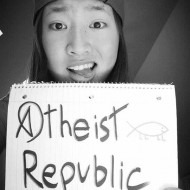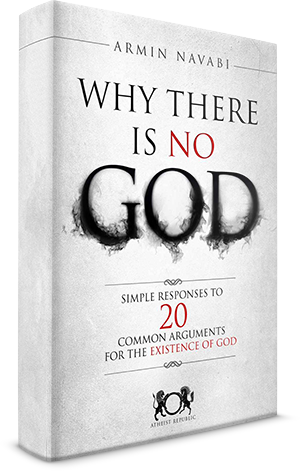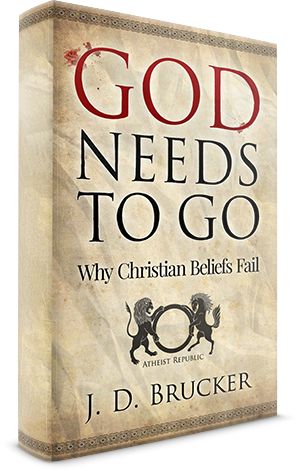Many atheists around the world today define atheism, in the words of an atheist, as the "lack of belief in a god or gods". But, is this what atheism really means? Well, let's take a look at where the word "atheist" comes from and what it meant. We'll also examine whether or not the atheist bears a burden of proof as this ties into this particular discussion.
The word "atheist" is Greek in origin. The word derives from the Greek prefix "a", which means "no", and the Greek suffix "theos" which means "god", to get the word "a-theos". Directly translated, the word "a-theos" means "no god". The Greek suffix "ism" was later added onto the word for it to become "a-theoism", or, "atheism". "ism" is added on so that the word can become a noun and then be attributed to a human. So, the word "atheism" *technically* means that you assert the nonexistence of a god or gods. The word originally meant that you believe that there are absolutely no gods.
The following definition of atheism comes from Dictionary.com: 1.) "The doctrine or belief that there are no gods."
2.) "Disbelief in the existence of a supreme being or beings."
The definition from my Webster's 21st. Century dictionary is the as follows: "Belief that no god exists."
So, we have discovered that atheism isn't really the lack of belief in any god(s), but more than that. It is the belief or the assertion that a god or gods do not exist and never have or will. Also, another dispute between atheists and Christians is whether or not atheism is a belief system. It is. As you can see from the definition of atheism, it is the *belief* that there exists absolutely no god(s). This affirms atheism as a belief system, no different than theism. Now, let's discuss why atheism is different than agnosticism, and how.
Agnosticism, as defined by Dictionary.com is as follows: "An intellectual doctrine or attitude affirming the uncertainty of all claims to ultimate knowledge." The definition from my Webster's 21st. Century dictionary defines "agnostic" as: "A person regarding the existence of God as unknowable." What this means is that agnosticism is, essentially, the withholding of any belief in God on the basis that one cannot ultimately know. It differs from atheism in that atheism directly asserts the non-existence of God, and this is why the burden of proof also lies on the atheist and we're going to discuss why.
Atheism bears a burden of proof because it makes an assertion which requires some form of affirmation, such as evidence. If you claim that you cannot draw any evidence for the nonexistence of God based on the notion that "you can't prove a negative", then your dodging the question, because nobody asked you to *prove* atheism as true. The atheist was asked to provide evidence not *for* the nonexistence of God, but to provide evidence *against* the existence of God, thusly, the atheist does, indeed, bear a burden of proof. You wouldn't be proving a negative, but disproving a potential positive. Anytime an assertion is made, you must provide evidence in support of this assertion. If you are not asserting that God does not exist, then you are not claiming atheism, you are claiming agnosticism. You are, then, merely withholding your belief in the existence of God rather than asserting that He does not exist.
The atheist bears a burden of proof because he, as an atheist, makes an assertion and, therefore, must provide support/evidence of said assertion.
Subscription Note:
Choosing to subscribe to this topic will automatically register you for email notifications for comments and updates on this thread.
Email notifications will be sent out daily by default unless specified otherwise on your account which you can edit by going to your userpage here and clicking on the subscriptions tab.





























An Atheist friend of mine would probably get angered if someone told him 'Atheism' was a belief system, he reminds me time and time again that he views his Atheism as a complete rejection of religion and beliefs altogether, and that he relies on science only to understand and explain his reality. Or when someone calls 'Atheism' a religion, he will lash out against that too. In one of my Early Christian Literature textbooks, actually written by the Atheist scholar Bart Erhman, he literally translates Atheism as meaning 'without the gods'.
But really, doesn't it seem like Richard Dawkins is the Pope of non-belief, attempting to convert the masses to his own Atheistic worldview? I realize that his campaign slogan is all about REASON! But you can be religious and still be a critical thinker.. many priests and theologians have dedicated their lives to the academic study of theology; doubting, questioning, rewriting, and intellectually arguing and rationalizing how their beliefs and spiritual practices make sense and contribute to ones own spiritual cultivation. But I really do like the New Atheist movement in the sense that it is challenging fundamentalist believers, in particular, into actually thinking critically about their beliefs... I'm not an atheist, but I love the criticism and pressure it is putting on believers to become more educated about their own theology.. and fundamentalism is for sure an illness that needs to be taken care of.. so I thank Dawkins for addressing it, although maybe to extremely at times.
Dawkins himself has said since he can't actually prove the non-existence of God, so that he is actually Agnostic, but that he thinks scientific evidence weighs heavily against the existence of a God... But I really think he needs to study more theology, not everyone is a uneducated fundamentalist lunatic, but I do enjoy it when he willingly confronts those people and challenges them.
I kind of went on a rant there.. But here is a question I am curious about, what if you simply don't care whether or not there is a God, and follow neither Atheism, Agnosticism, or Theism at all? How do you label yourself then? Do you just say that your unaffiliated?
Bill Maher calls himself an 'apatheist', cause he thinks anything religious is ridiculous. But I'm wondering if you think Atheism is as ridiculous as Theism, what do you call yourself then? Is there any escape from labels?
I agree with your thoughts completely. I like how modern atheism challenges believers to question their faith and look for God within science and the world today.
If somebody has no affiliation with theism, atheism, or agnosticism and doesn't really care, I would consider them unaffiliated, as you put it.
I would also continue to assert that atheism is a belief system. Does your friend not hold faith in science? Does he not hold faith and does he not *believe* that science will find answers?
I would like to study and learn more about the philosophy of science. I think that faith is definitely involved in science. William James, the father of American psychology and a pragmatic philosopher would also agree with us. He argues what you just said in his essay "Will to Believe". http://m.youtube.com/watch?v=IvAq9N05I8s (a silly video, but gets the point across)
I suspect you do not believe in unicorns, or tooth fairies, or Easter bunnies. In an existential argument, do you think you bear the burden to disprove those entities, or would rather a person who asserts their existence bear the burden to provide evidence? Is your default position that everything imaginable exists and has to be disproved for you reasonably not to believe in its existence?
I don't believe in all of the listed things not because there is no evidence of there nonexistence, but because there *is* good evidence that they *don't* exist.
Sorry to burst your bubble there Sock of God, but unicorns did exist just not as you might imagine http://en.wikipedia.org/wiki/Elasmotherium So oddly there is more proof of Unicorns than that of your god.
That's not a unicorn, though. That's an Elasmontherium. It's related to the rhinoceros, not the horse. There's a difference. And there is--nor have I ever claimed that there was--no proof for God. There is, however, good evidence to believe that God exists.
Did you read the whole thing? Its kind of a cross between a unicorn and a rhino. This could have been the original unicorn and stories describing it may have transformed unicorns into the illustrations we have today.
Lets as an exercise draw a burning bush and see if there are any differences in my burning bush than yours. You post your picture on here and I'll post mine. After that we can pick out differences like what type of bush was used and exactly how much fire it was emitting and make our case, then we can tell everyone which of our pictures is a better illustration of this unproveable for lack of evidence god of yours we could have the board vote and see who wins. The title of the contest could be The Burning Bush of Moses.
Please share examples of your good evidence that leprechauns do not exist.
While you're at it, do you have evidence that the universe was *not* created by the Flying Spaghetti Monster?
The thing is, we, as humans, don't believe in these things not because there is no evidence that they don't exist, but because there *is* good evidence that they don't exist, thus, this vitiates your claims. If you, or anybody, were to believe that a flying spaghetti monster existed I would disregard them as mentally insane.
I still await this good evidence that leprechauns do not exist and that the flying spaghetti monster did not create the universe.
What additional evidence is there for the existence of your god than there is for the existence of Isis, Thor, Mixcoatl, Zeus, or the Flying Spaghetti Monster?
The historicity of Jesus Christ.
Let's say I accept that a teacher around whom the Jesus stories arose existed historically. How would his existence constitute evidence that leprechauns do not exist or that the flying spaghetti monster did not create the universe?
I'm starting to think you believe in the flying spaghetti monster, you bring him up so much. And there is no good reason to believe in leprechauns or the flying spaghetti monster. There exists evidence *against* the existence of such creatures, that is why I, along with most sane people, believe they don't exist.
Can you show me that the flying spaghetti monster does exist? After all, the burden of proof lies on you, you're the one claiming he exists...
Oh dude, you believe in a mighty being that created the universe. The only difference between the being you believe in and the Flying Spaghetti Monster is their appearance. Are you saying god couldn't look like a giant pile of spaghetti if it so chose? No one has seen god, so who can say what it looks like?
Well, if that case, the flying spaghetti monster wouldn't be a flying spaghetti monster, it would be God! He would just *look* like a flying spaghetti monster.
Secondly, the whole "flying spaghetti monster" thing is what is known as an inconsistent comparison fallacy. The idea of a "flying spaghetti monster" is not consistent with the concept of God. The inconsistent comparison fallacy is taking two completely different things, finding one or more traits they have in common, connecting those traits and claiming that, therefore, these objects or entities are the same thing. For example, "apples and oranges are the same thing because they both have skin". This is a blatantly false, as is the comparing of a "flying spaghetti monster" to God.
Ok, so let's just say god is real. What makes you so sure that would be a good thing?
Because God is, by his very nature, loving and merciful.
Prove it without using the bible.
He revealed this to us through Jesus Christ. Who was a real man, and who did teach that God has an everlasting, unconditional love for all of us. This is *not* suggesting that Jesus, himself, was divine, but history tells us that he did preach these beliefs fervently.
Actually, you know what, go ahead and use the bible. Just remember all the people he had killed in his name, remember how he purposefully hardened the pharaoh's heart so that he could make him suffer more. Remember that ultimately, god created the devil which then allowed evil into the lives of humans as well as death. Oh, god has done plenty of good, but you cannot ignore the evil deeds.
I disregard the Bible as a truthful Christian doctrine and feel that most of what is expressed in this book did not really happen, save for what has been scientifically or historically shown.
Secondly, Lucifer was an angel who, willingly, rebelled against God thus creating evil. He loathed God for creating humans, he loathed humans, and God banished him to Hell.
If god was perfect, then his creations should not have been defective. 1/3 of all angels went against god.
And the bible is the only kind of document to base god on. You don't get to just pick and choose which qualities of god are in there and disregard the negative. In fact, the bad events probably have better documentation than the good ones.
God's nature is not dependent on the Bible, and my view of God comes from a theological ad philosophical view that is based on the traits that God must possess if He is to be God.
I just need to ask this: do you think you have accomplished anything here beyond alienating people? You might not agree with atheist views, but you don't have to constantly try to disprove them all the time. I am not trying to make you atheist, so why are you trying to make us theists if all it does is upset us?
I am not trying to convert you. I am here to represent Christianity and show why I believe it is a valid world view, as well as give evidence for my beliefs and provide evidence against atheism.
I'm *still* trying to find out if there is a limit to the nested comments... let's keep this going :)
I never said anything about conversion, I am talking about how you are upsetting people by proclaiming that only your ideas are logical or correct. You do not give people the benefit of the doubt, or at the very least admit that their theories are possible, even if you don't personally believe they are right.
If you read my comments closely, you will not find where I claim the Flying Spaghetti Monster exists. I have simply asked what evidence you have that he does *not* exist, and you have provided nothing conclusive. The point here is that you have no more evidence that FSM does not exist than the rest of us have that your god does not exist. Likewise, there is no more or less evidence for your god than there is for any other.
Pages